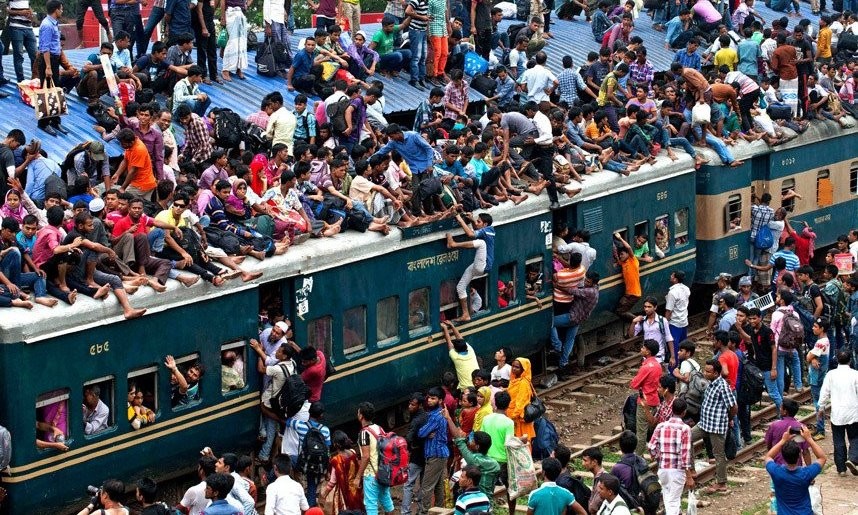
If you follow my work, you will often hear me say overpopulation is a number one world leading problem today.
Statistically, it is estimated that there are 7 billion people. Let’s consider the implications of these numbers.
If asked to imagine 1,000 people in one room, the majority of people will struggle. The exercise becomes even more difficult when asked to imagine 10,000 or 1,000,000 people. 7 billion people are unimaginable, and yet that what it is. What is even more astonishing is that this number is expected to grow by factor of billions in upcoming years.
Majority of people are said meet and get to know few thousand of people in their lifetimes and to have an average of 649 friends on Facebook. Even the most influential person on the planet, like a president of USA, will not be able to connect to 7 billion people, there will be always someone somewhere who does not know who he is.
Some of the bloodiest wars and most destructive diseases have reduced the human population by huge numbers but never in a way that people could not recover and come back in even greater number.
But what are other implications on having 7 billion people on this planet?
On one side, it puts a huge constraint on resources. My prediction is and always was that almost all modern world problems are directly or indirectly influenced by overpopulation, meaning that if there were fewer people there would be fewer problems.
Take refugee crisis, for example, on which I have written extensively. It is a problem of overpopulation. The cause of the problem people say is ISIS, but ISIS cannot do more to people than people can do to themselves. Few hundred refugees coming to Europe every day or so is not a problem, but when this number becomes tens of thousands, this become unsustainable. For me the problem is not in ethics of accepting or rejecting people, it is problem with mere amount of people on the planet.
All people want to live better. It is human nature to want more and more. Furthermore, any footage of refugees is followed by a footage of children and babies. That’s what the problem is!
We have all probably heard of families with 7 or 8 children, and even a larger amount of cousins and nieces. I certainly have. Many of these families don’t have money to sustain themselves and yet they want to have new babies. Why?
In one study by Mahutga M. C., & Smith D. A. (2010), authors looked and correlations between different economic social and economic factors. One of many conclusions was that population growth was correlated with the level of education, meaning the in places with lower the education (e.g.m Africa and Middle East) people were likely to have more children. Of course, the level of education was correlated with economic income in these countries, meaning the more economically advanced countries were the better educated they were as well, which is why we see advanced economies actually decreasing in amount of population (e.g., West).
I took the relevant numbers from the paper to demonstrate the correlation.
| 1 | 2 | 3 | 4 | 5 | 6 | 7 | |
| Population growth | -0.304 | -0.343 | -0.586 | -0.561 | 0.001 | 0.306 | 0.457 |
1 – Economic growth; 2 – GDP per capita; 3 – Secondary education enrolment; 4 – West; 5 – Asia; 6 – Africa; 7 – Middle East
Following the conclusions of this study, many NGOs propose to increase the education level in less developed parts of the world. Other NGOs are pushing for a 1 child policy in the whole world and estimating that a sustainable amount of people is 1-2 billions.
Having children is also a right of passage, a routine that people do when they arrive at a certain period in their lives, like having a dinner. Dinner is an integral part of our lives and people plan their lives around times when they have food. The same goes for babies. People want to have them at specific times of life, somewhere when they are between 20-35 years old.
I have spoken to one of my friends and asked how many children she wanted to have. She said, instantly, 3. So I asked her “why”. The reason was that she has 2 other sisters and she was raised in a house of many children so she wanted the same for her children. I asked her whether it would be difficult to raise 3 children, to which she answered that she would have to be strict with her children as her parents were strict with her. She, indeed, lived in one of these families with a lot of nieces and cousins.
Essentially, my friend’s logic was the same as of her parents. Nothing more added. This is indeed the logic of so many people in the world, which in addition to a young age of having children, adds up to 7 billion people.
It is almost a bragging right to see as many generations in one family to come together – grandmother seeing grand-grand-grand children. So the grandmother saw her grandchildren, now what?
Adoption does not seem to be a solution either.
One of my friends was adopted. When he grew up he changed the name to the original name his biological mother gave him, even though he never met her.
This is to say that no one wants to be a part of someone else family, provided they have a choice to have their own family.
Genetically, as logic goes, the only reason we are here is because people in our family tree did a good job of having children until we were born. They have successfully transferred genes into next generations, transferring their genes into the future. It is a deep routed ego thing.
Lastly, and perhaps even more importantly, we have created a constitution that protecting human life. We did one for humans, but we forgot about the one for everything else, like animals and plants. Interestingly enough, an unborn life does not have the same value as a life of a person on the planet right now, nor does it hold the same as the lifelong past away.
This is to say that our morality is a concept that may need to be reviewed.














